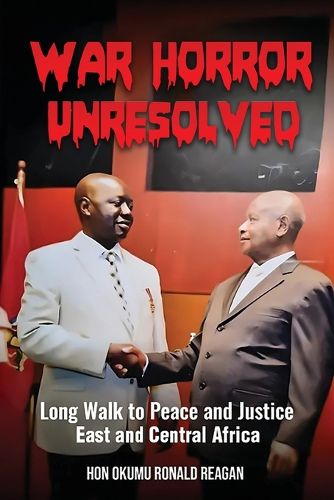Readings Newsletter
Become a Readings Member to make your shopping experience even easier.
Sign in or sign up for free!
You’re not far away from qualifying for FREE standard shipping within Australia
You’ve qualified for FREE standard shipping within Australia
The cart is loading…






This title is printed to order. This book may have been self-published. If so, we cannot guarantee the quality of the content. In the main most books will have gone through the editing process however some may not. We therefore suggest that you be aware of this before ordering this book. If in doubt check either the author or publisher’s details as we are unable to accept any returns unless they are faulty. Please contact us if you have any questions.
The book delves into the complexities of ethnic conflict in Uganda, executed with horror that spread throughout East and Central Africa with devastating effects. After an international conspiracy of silence on cliency relationships, the war later hankered on the global War on Terror for over two decades. It drew in global actors from the U.S., U.N., and ICC without apparent success. The book traces the historical trajectory of the ethnic conflict in Uganda, which was bent on hegemony from a time of state formation, and how the war got intertwined with various players' regional and international interests. It explores early attempts by Libya, Iran, Malawi, and the Carter Centre to mediate the conflict. The book analyzes how politics and international relations influence conflict resolution and the failure of the global governance system in contrast to the role of power blocks such as the European Union and bilateral engagement in resolving conflict. It examines the effective role of international civil society and the influence of world citizens on their government to act on a conflict in a foreign land. The book contains a unique participants' observer perspective, with the writers taking on various roles, such as victims, advocates, and peacemakers, offering a deep understanding of the conflict that engulfed five countries and lasted 27 years without absolute resolve. The book exposed the contradictory ideological no-party democracy system in Uganda, supported by the West, and how the regime perpetuated conflict and corruption for regime survival.
$9.00 standard shipping within Australia
FREE standard shipping within Australia for orders over $100.00
Express & International shipping calculated at checkout
This title is printed to order. This book may have been self-published. If so, we cannot guarantee the quality of the content. In the main most books will have gone through the editing process however some may not. We therefore suggest that you be aware of this before ordering this book. If in doubt check either the author or publisher’s details as we are unable to accept any returns unless they are faulty. Please contact us if you have any questions.
The book delves into the complexities of ethnic conflict in Uganda, executed with horror that spread throughout East and Central Africa with devastating effects. After an international conspiracy of silence on cliency relationships, the war later hankered on the global War on Terror for over two decades. It drew in global actors from the U.S., U.N., and ICC without apparent success. The book traces the historical trajectory of the ethnic conflict in Uganda, which was bent on hegemony from a time of state formation, and how the war got intertwined with various players' regional and international interests. It explores early attempts by Libya, Iran, Malawi, and the Carter Centre to mediate the conflict. The book analyzes how politics and international relations influence conflict resolution and the failure of the global governance system in contrast to the role of power blocks such as the European Union and bilateral engagement in resolving conflict. It examines the effective role of international civil society and the influence of world citizens on their government to act on a conflict in a foreign land. The book contains a unique participants' observer perspective, with the writers taking on various roles, such as victims, advocates, and peacemakers, offering a deep understanding of the conflict that engulfed five countries and lasted 27 years without absolute resolve. The book exposed the contradictory ideological no-party democracy system in Uganda, supported by the West, and how the regime perpetuated conflict and corruption for regime survival.